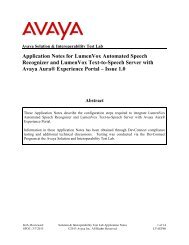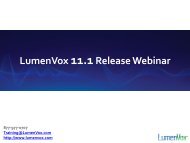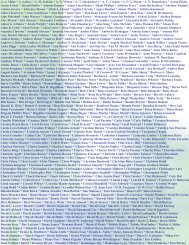1 - LumenVox
1 - LumenVox
1 - LumenVox
You also want an ePaper? Increase the reach of your titles
YUMPU automatically turns print PDFs into web optimized ePapers that Google loves.
Supporting Standards<br />
<strong>LumenVox</strong> supports the W3C's Speech Recognition Grammar<br />
Specification (SRGS), part of the VoiceXML 2.0 and SALT<br />
specifications. Companies that track these specifications are<br />
dedicated to the future of speech, and to integrating with<br />
other companies committed to promoting speech recognition.<br />
The <strong>LumenVox</strong> SRGS implementation is backward compatible<br />
with the existing <strong>LumenVox</strong> BNF grammar format; current<br />
deployments will leverage the power of the SRGS system<br />
immediately and transparently.<br />
Both companies (<strong>LumenVox</strong> and<br />
SandCherry) have focused on simplifying<br />
the development, integration, and<br />
deployment of speech services while<br />
maintaining affordability.<br />
Charles Corfield<br />
President and CEO of<br />
SandCherry<br />
<strong>LumenVox</strong> recognizes that the speech community will need to<br />
work together to develop solutions for businesses, and as<br />
such, <strong>LumenVox</strong> applications complement the following<br />
technologies:<br />
VXML<br />
VoiceXML (VXML) is a mark-up language designed to code speech<br />
applications with many of the same architectural components as HTML.<br />
VoiceXML platforms connect to a combination of speech recognition engines,<br />
text-to-speech synthesis, telephony interfaces and VoiceXML interpreter<br />
software to process the call. In order to interface VXML with any speech<br />
engine, the engine must understand SRGS and SISR.<br />
<strong>LumenVox</strong>'s Speech Engine is compliant with what VXML expects, and our<br />
engine powers the speech recognition portion of several VXML platforms.<br />
SALT<br />
Speech Application Language Tags (SALT) is similar to VoiceXML but also<br />
adds support for multi-modal systems. SALT extends existing mark-up<br />
languages such as XHTML, XML, and HTML. Similar to our work with VXML,<br />
the <strong>LumenVox</strong> Speech Recognition Engine conforms to SALT specifications.<br />
Semantic Interpretation<br />
Engine Features and Functionality:<br />
Streaming audio<br />
<strong>LumenVox</strong> has implemented the W3C's Semantic Interpretation for Speech<br />
Recognition (SISR) working draft, also part of the VoiceXML 2.0 specification.<br />
SISR allows grammar authors to embed snippets of JavaScript code into<br />
Supports English, Latin American Spanish, and Canadian French<br />
their SRGS grammars, to automatically transform what a speaker says into a<br />
format understandable to an application. With <strong>LumenVox</strong>'s Semantic Tags,<br />
Flexible API easily integrates into current OA&M, billing, provisioning, and debugging<br />
callers can say, "September thirteenth two thousand four," and your<br />
systems<br />
application will understand "2004-09-13."<br />
<strong>LumenVox</strong> is committed to supporting the W3C's working draft. As the draft<br />
evolves, we will support both new and old drafts, so application developers<br />
can be confident that their grammars and tags will perform to specification.<br />
Client/Server architecture distributes speech-processing load<br />
Run time defined grammars entered as simple text, BNF, raw phonetic spelling, or SRGS<br />
Advanced dynamic barge-in adapts to each call in real-time<br />
SDK includes documentation and a demonstration C/C++ application<br />
10 Flexible error recovery through the use of confidence scores and n-best results<br />
11





